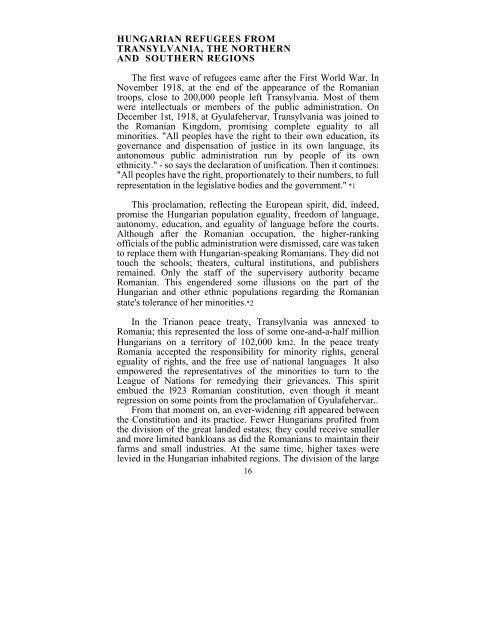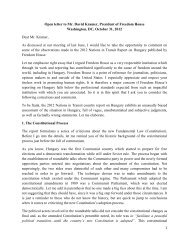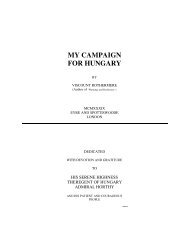the text - Corvinus Library - Hungarian History
the text - Corvinus Library - Hungarian History
the text - Corvinus Library - Hungarian History
Create successful ePaper yourself
Turn your PDF publications into a flip-book with our unique Google optimized e-Paper software.
HUNGARIAN REFUGEES FROM<br />
TRANSYLVANIA, THE NORTHERN<br />
AND SOUTHERN REGIONS<br />
The first wave of refugees came after <strong>the</strong> First World War. In<br />
November 1918, at <strong>the</strong> end of <strong>the</strong> appearance of <strong>the</strong> Romanian<br />
troops, close to 200,000 people left Transylvania. Most of <strong>the</strong>m<br />
were intellectuals or members of <strong>the</strong> public administration. On<br />
December 1st, 1918, at Gyulafehervar, Transylvania was joined to<br />
<strong>the</strong> Romanian Kingdom, promising complete eguality to all<br />
minorities. "All peoples have <strong>the</strong> right to <strong>the</strong>ir own education, its<br />
governance and dispensation of justice in its own language, its<br />
autonomous public administration run by people of its own<br />
ethnicity." - so says <strong>the</strong> declaration of unification. Then it continues:<br />
"All peoples have <strong>the</strong> right, proportionately to <strong>the</strong>ir numbers, to full<br />
representation in <strong>the</strong> legislative bodies and <strong>the</strong> government." *1<br />
This proclamation, reflecting <strong>the</strong> European spirit, did, indeed,<br />
promise <strong>the</strong> <strong>Hungarian</strong> population eguality, freedom of language,<br />
autonomy, education, and eguality of language before <strong>the</strong> courts.<br />
Although after <strong>the</strong> Romanian occupation, <strong>the</strong> higher-ranking<br />
officials of <strong>the</strong> public administration were dismissed, care was taken<br />
to replace <strong>the</strong>m with <strong>Hungarian</strong>-speaking Romanians. They did not<br />
touch <strong>the</strong> schools; <strong>the</strong>aters, cultural institutions, and publishers<br />
remained. Only <strong>the</strong> staff of <strong>the</strong> supervisory authority became<br />
Romanian. This engendered some illusions on <strong>the</strong> part of <strong>the</strong><br />
<strong>Hungarian</strong> and o<strong>the</strong>r ethnic populations regarding <strong>the</strong> Romanian<br />
state's tolerance of her minorities.*2<br />
In <strong>the</strong> Trianon peace treaty, Transylvania was annexed to<br />
Romania; this represented <strong>the</strong> loss of some one-and-a-half million<br />
<strong>Hungarian</strong>s on a territory of 102,000 km2. In <strong>the</strong> peace treaty<br />
Romania accepted <strong>the</strong> responsibility for minority rights, general<br />
eguality of rights, and <strong>the</strong> free use of national languages It also<br />
empowered <strong>the</strong> representatives of <strong>the</strong> minorities to turn to <strong>the</strong><br />
League of Nations for remedying <strong>the</strong>ir grievances. This spirit<br />
embued <strong>the</strong> l923 Romanian constitution, even though it meant<br />
regression on some points from <strong>the</strong> proclamation of Gyulafehervar..<br />
From that moment on, an ever-widening rift appeared between<br />
<strong>the</strong> Constitution and its practice. Fewer <strong>Hungarian</strong>s profited from<br />
<strong>the</strong> division of <strong>the</strong> great landed estates; <strong>the</strong>y could receive smaller<br />
and more limited bankloans as did <strong>the</strong> Romanians to maintain <strong>the</strong>ir<br />
farms and small industries. At <strong>the</strong> same time, higher taxes were<br />
levied in <strong>the</strong> <strong>Hungarian</strong> inhabited regions. The division of <strong>the</strong> large<br />
16
















